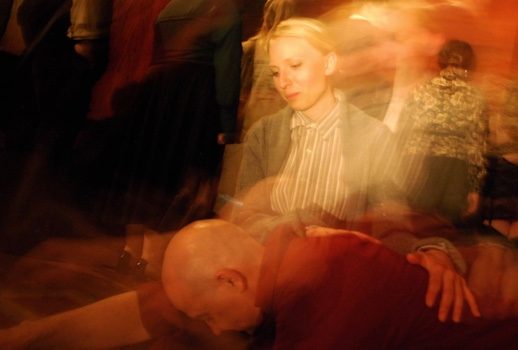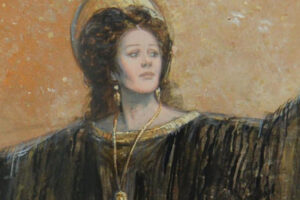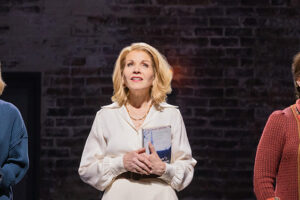

Latouche, who died, far too young, in 1956, was the immensely clever lyricist for, among other things, Cabin in the Sky, Candide, The Golden Apple (to be revived by Encores! at City Center next week) and Douglas Moore’s great American opera, The Ballad of Baby Doe, produced by the inventive Utopia Opera this weekend and next.
The Ballad of Baby Doe is best remembered as a vehicle that launched Beverly Sills towards stardom. The role was one of her breakout performances at the New York City Opera and her first commercial recording. The company revived the opera several times (there was a telecast), but it has failed to remain in the general repertory.
The opera’s obscurity is difficult to understand: Moore’s score has everything that could please and little that could offend. The libretto, based on a true American story of love and money, of rise and fall, is impressively tight considering that it covers 20 years. The melodies are attractive (the “Willow” song and the letter song, “Dearest Mama,” have become, thanks to Sills, pretty much standard in the American lyric soprano repertory, and the melodies are worthy of that place.)
The brief incidence of startling harmonies occur at appropriate moments of chaos in the story, the conversational scenes that may have seemed “unoperatic” (or too realistic) when the opera was new predicted the direction American opera would take in the decades that followed. The opera is full of lovely things and features three meaty leading roles and many likeable cameos. It should be a more regular visitor.
Utopia Opera plays in Hunter College’s Lang Recital Hall, the size of the living room in a not too ritzy duplex. This seems an unlikely venue for so grand a score, with its full orchestra and scenes of hotel lobbies, political rallies and grand Washington wedding receptions, but Utopia thrives on such challenges. An orchestra of fourteen (only five strings) fills a third of the stage and performs a decidedly cut-down version of the music. The set consists of four chairs and a number of late-nineteenth-century photographs of Colorado real estate on the sort of easel that used to introduce vaudeville acts.
There are twenty-nine named roles, and even with some doubling (the three leading roles are all double cast), the chorus has no room for the anonymous. The stage direction, by Gary Slavin, hits its marks inventively. The conductor is the company’s director, William Remmers, whose attention to detail matches his daring in choice of repertory. There are supertitles; they are sometimes, infrequently, necessary.
On the opening night, Saturday (the opera runs this weekend and the next), Baby Doe was sung by Angela Dinkelman, whose soprano sits very pleasantly in the middle voice where most of the role lies but rises prettily to the D’s and C-sharps as called for. She is a warm actress if not quite as flirtatious as the opening scenes seem to require, and she seemed short of breath in the final monologue over the dying Horace. But one believed in the sincerity of her love for him, and if that comes across and the silvery high notes are there, Baby Doe works for us.
Jack Anderson White had the plum role of Horace Tabor, and if it was hard to credit his pick-and-shovel past, his sturdy baritone was properly decisive and the self-delusion that leads him from triumph to bankruptcy sadly credible. His rather set expression seemed properly that of a man who refuses to listen when disagreed with.
In many ways, the balance to the opera’s heroine is the near-tragic figure of Augusta, Horace’s prim, later furious, first wife. Frances Bible used to munch the entire City Opera stage with this part and her powerhouse mezzo. Elizabeth Bouk has the ill luck to be just as tall and blonde and pretty as Dinkelman’s Baby Doe, disadvantages she met by tying her hair in a severe bun and tottering on a cane in Act II.
She almost brought it off. Her voice is attractive if slightly underpowered—the orchestra sometimes drowned her out, and she did not really sell such moments as the discovery, when reading a letter of Horace’s, of the name of her rival, or her tremendous warning: “Sell the Matchless Mine!” Here, the unfairness perhaps is mine—by the time I saw Bible sing the role, she’d had years to work out just which notes and syllables would knock us off our feet and she looked like a tanker. Bouk simply requires more experience with this splendid role to achieve its effect.
Among the many, many supporting roles, I was particularly pleased with the four ladies who play Augusta’s cronies, egging her on to destroy her faithless husband. But Moore wrote these roles as a bit of ill-natured Greek chorus, like the similar gossips who deplore his Susannah. They are ripe for the plucking. The ladies of Utopia Opera had a grand time. The four card sharps who turn their backs on bankrupt Horace weren’t enjoying themselves quite so much























Comments